Croatia in the EU: lessons from the Bulgarian accession
Ralitsa Kovacheva, December 3, 2010
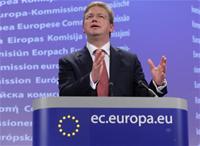 “No country will join the European Union before being 100% ready to do so. Equally, we must make sure that the European Union is 100% ready before it enlarges to include new countries.”
“No country will join the European Union before being 100% ready to do so. Equally, we must make sure that the European Union is 100% ready before it enlarges to include new countries.”
These words of European Commissioner for Enlargement Stefan Fule show that the EU has learned the necessary lessons from previous enlargements. Presenting Croatia's 2010 progress report of the European Commission (part of EU's enlargement package), Fule assured that the case of Bulgaria and Romania will not happen again (without, of course, mentioning them explicitly). As you know, because of ongoing significant weaknesses in justice and home affairs, on both countries the so called CVM (Cooperation and verification Mechanism) has been imposed.
“The Commission considers that negotiations should be concluded once Croatia has met outstanding closing benchmarks, in particular in the field of judiciary and fundamental rights, including fight against corruption, thus removing the need for the EU to consider a cooperation and verification mechanism after accession.”
Croatia is now on the finish line of the negotiation process and its Accession Treaty is already being drafted. The country received a candidate status for membership in June 2004, and a year later the negotiation process has started. Currently the country has closed 25 out of 35 negotiating chapters. The most difficult are yet to be walked through: competition; agriculture; fisheries; regional policy; judiciary and fundamental rights; justice, freedom, security; environment; foreign, security and defence policy; budget; and 'other issues'.
The judicial system
Commission’s most serious observations are in the field of judicial reform. It should be noted, however, despite the ongoing weaknesses, that the Commission nevertheless reported progress on some criteria, moreover, the country still has not opened the relevant chapters.
“Implementation of judicial reform has continued, although the main expected 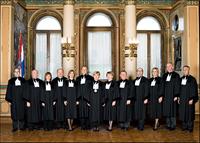 results of the reform process are yet to be seen”, the report reads. Constitutional amendments have also been made as a package of legislative changes, aimed at strengthening the independence of the judiciary. As a result, the State Judicial Council consists of 11 members: seven judges to be elected by peers, two law professors and two members of Parliament. The composition of analogical Prosecutorial Council is similar. Progress is noted with respect to impartiality of the judiciary. Despite continuing weaknesses in their functioning, “it is important that these bodies demonstrate independence and accountability, especially when performing their key functions in the area of appointments, discipline and career management, so that effective self regulation of the judicial profession is assured.”
results of the reform process are yet to be seen”, the report reads. Constitutional amendments have also been made as a package of legislative changes, aimed at strengthening the independence of the judiciary. As a result, the State Judicial Council consists of 11 members: seven judges to be elected by peers, two law professors and two members of Parliament. The composition of analogical Prosecutorial Council is similar. Progress is noted with respect to impartiality of the judiciary. Despite continuing weaknesses in their functioning, “it is important that these bodies demonstrate independence and accountability, especially when performing their key functions in the area of appointments, discipline and career management, so that effective self regulation of the judicial profession is assured.”
Now the Judicial Council and not the Ministry of Justice appoints the chairmen of the courts. A new procedure for selection of judges and prosecutors was implemented. The state Judicial Council has adopted a more transparent methodology for local councils to evaluate judges for their promotion. Last year the Council has conducted 14 disciplinary proceedings, the outcome of which was only a fine, a conviction and one resignation. In the same period there have been no disciplinary proceedings against any prosecutor. It is necessary to ensure systematic inspection of the property declarations of judges and prosecutors, is noted in the report.
 However, the Commission is satisfied with the progress of implementation of the new Criminal Procedure Code. “Applicable to organised crime and corruption cases since 2009, the new procedure has accelerated the investigation phase, with better cooperation between the police and prosecution services leading to more indictments.” And the next note shows how Croatia has resolved the issue of the so called specialised court, which caused so much controversy in our country (Bulgaria): four specialised chambers of the USKOK (the office for the fight against corruption and organised crime) have been created at County Courts. The problem is that there are now about 200 pending cases and the 54 judges, working in these specialised chambers, have not been relieved of their previous duties.
However, the Commission is satisfied with the progress of implementation of the new Criminal Procedure Code. “Applicable to organised crime and corruption cases since 2009, the new procedure has accelerated the investigation phase, with better cooperation between the police and prosecution services leading to more indictments.” And the next note shows how Croatia has resolved the issue of the so called specialised court, which caused so much controversy in our country (Bulgaria): four specialised chambers of the USKOK (the office for the fight against corruption and organised crime) have been created at County Courts. The problem is that there are now about 200 pending cases and the 54 judges, working in these specialised chambers, have not been relieved of their previous duties.
There are still some deficiencies with regard to financial crimes. The European Commission recommends improvement of international cooperation on the collection of admissible evidence, to reinforce investigation and prosecution of tax fraud related to corruption activities and to strengthen the prosecution of money laundering within corruption cases. “Croatia will need to pay particular attention to implementation of new provisions for the management of confiscated assets.”
Special attention is paid in the report to the problem of the investigation of the war crimes. In the period 2009-2010 there are approximately two dozen on-going trials. “More cases involving Croat perpetrators, including members of the Croatian armed forces, were pursued.”
Steps have been taken to protect witnesses. Overall, however, impunity for war crimes remains a problem, especially when the victims are ethnic Serbs or the defendants are from the Croatian security forces. There are still hundreds of cases awaiting investigation and charges.
“Overall, the reform of the judiciary has continued, but significant challenges remain, in particular application of objective and transparent criteria for the appointment of judges and prosecutors, reduction of the case backlog, the excessive length of proceedings and enforcement of court decisions.”
The fight against corruption
A good progress is recognised, however, in the fight against corruption. Implementation of anti-corruption strategy and the related action plan has continued. A special anti-corruption programme for state enterprises was adopted. “The overall number of cases being handled by USKOK has increased”, including investigations of “possible high-level corruption involving senior political figures.”
The number of cases investigated by the anti-organised crime and corruption, including investigations of senior political figures for high-level corruption, has increased. The number of court verdicts has also increased. The legal framework was improved as the overall coordination of the anti-corruption effort, but the sector suffers from a lack of personnel and insufficient prevention.
As a positive fact are noted the changes that were made in the internal structure of the Commission for the Prevention of Conflicts of Interest in order to give it greater independence from Parliament. (A similar recommendation was included in the latest CVM report on Bulgaria.) “Legal provisions have been introduced to depoliticise appointments to supervisory boards of state-owned companies”. The measures, however, are not yet operational and legal sanctions remain weak. Overall, “corruption remains prevalent in many areas”, the Commission concludes, and a major problem is the lack of “a culture of political accountability for the corruption cases which are coming to light”.
Little progress is reported on public administration reform; the administrative capacity and decentralisation are insufficient. No improvement is reported on the implementation of legislation on access to information. “Shortcomings remain in the financing of political activities and election campaigns, particularly regarding transparency and independent oversight. There is insufficient scrutiny of and transparency in the execution of public procurement contracts”.
As regards freedom of expression, including media freedom and pluralism, editors and journalists have continued to report excessive political pressure. Little progress is noted in the investigation of threats against journalists working on cases related to corruption and organised crime. The independence of local media is still a problem.
A key priority in the accession process is Croatia’s cooperation with the 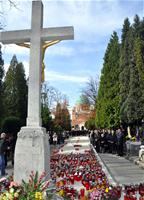 International Criminal Tribunal for former Yugoslavia. The report noted that Croatia continues to cooperate with it, but the problem of access to important documents remains. The country has improved its relations with neighbouring countries, especially within the Process of Sarajevo. The ministerial meeting in Belgrade in March this year is specially mentioned, where Bosnia and Herzegovina, Croatia, Serbia and Montenegro have committed to solve the refugee problem and other unresolved issues by the end of this year. The Commission notes resolving border disputes, the question of property and return of refugees as priority issues. As of August 2010 over 14,000 people are still missing as a result of conflicts in the region. “In Croatia, exhumations at known gravesites are still to take place. The number of unidentified cases remains high.”
International Criminal Tribunal for former Yugoslavia. The report noted that Croatia continues to cooperate with it, but the problem of access to important documents remains. The country has improved its relations with neighbouring countries, especially within the Process of Sarajevo. The ministerial meeting in Belgrade in March this year is specially mentioned, where Bosnia and Herzegovina, Croatia, Serbia and Montenegro have committed to solve the refugee problem and other unresolved issues by the end of this year. The Commission notes resolving border disputes, the question of property and return of refugees as priority issues. As of August 2010 over 14,000 people are still missing as a result of conflicts in the region. “In Croatia, exhumations at known gravesites are still to take place. The number of unidentified cases remains high.”
The economy: fiscal consolidation and structural reforms
The observations in terms of economic criteria are far fewer. According to the report, Croatia is a functioning market economy, able to cope with competitive pressure and market forces within the EU.
Croatian economy was hit hard by the crisis in early 2009, when the GDP fell by 6.7 % year-on-year. For 2009 as a whole, the GDP declined by 5.8%. Private consumption also fell sharply - by 8.5%, investment fell by 11.8 %, exports - by 16.2%, imports - by 20.7 %, industrial production - by 10%. The economic recovery in the country has not yet begun, although the drop of performance is not so serious, the report says. “The high and growing level of external debt and the relatively large exposure of the non-tradable sector to currency risks remain key external vulnerabilities of the Croatian economy.“
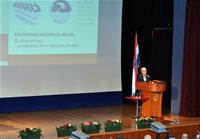 In response to the crisis, in April 2010 the government launched the “Economic Recovery Programme”. Besides fiscal incentives, the programme is “a package of structural reforms which seek to address the structural weaknesses of the economy and aim to create an environment encouraging sustainable economic growth”. The document includes 131 measures in 10 areas that need to be implemented in the next 10 years. These include reducing the number of employees in the public sector, privatising state enterprises and reduction of non-tax revenues, and a wide range of measures in the labour market, education, science, social security, export and investment promotion. The Programme's success will depend on the effectiveness of its implementation, the report says.
In response to the crisis, in April 2010 the government launched the “Economic Recovery Programme”. Besides fiscal incentives, the programme is “a package of structural reforms which seek to address the structural weaknesses of the economy and aim to create an environment encouraging sustainable economic growth”. The document includes 131 measures in 10 areas that need to be implemented in the next 10 years. These include reducing the number of employees in the public sector, privatising state enterprises and reduction of non-tax revenues, and a wide range of measures in the labour market, education, science, social security, export and investment promotion. The Programme's success will depend on the effectiveness of its implementation, the report says.
A key challenge for Croatia remains the provision of medium-term fiscal stability. In 2009, three budget revisions have been made and yet, instead of the expected budget deficit of 3.4 % of GDP, the country ended the year with a deficit of 4.1 %. In the 2010 budget a deficit of 3.3 % was set, but in August a budget revision was made on the basis of an expected economic slowdown of 1.6 %, according to which the deficit would reach 5.2 %. According to the latest data of the Croatian government, the public debt amounted to 35.4 % of GDP in mid-2010. But “when outstanding state guarantees and the debt of the State Development Bank (HBOR) are included, the level of public debt amounted to 53.5% of GDP”.
The Commission's assessment is that the authorities have made limited effort to manage the deficit. “Weaknesses remain in budget planning, posing a risk that budget outcomes will continue to diverge significantly from budget projections.”
On another key accession priority - to achieve rationalisation of public spending, progress is also minimal. Some measures have been taken, such as optimisation of the hospital network and creation of a supplementary health insurance system. “No specific action has been taken so far to achieve better targeting of social support, but this is now planned under the Economic Recovery Programme.”
One of the most serious problems of Croatia, like Bulgaria, is labour 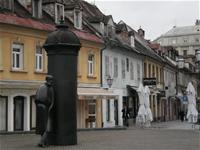 market. The unemployment rate has risen to 12.4 percent in the third quarter of 2010. What is worse is that the Croatian labour market suffers from a number of structural weaknesses such as high rate of youth unemployment and low employment and participation rates. One of the conclusions in the report, which sounds extremely familiar to Bulgarians is: " The effective retirement age remained low and significant labour supply disincentives persisted, including generous early retirement rules and the predominance of categorical social welfare benefits.”
market. The unemployment rate has risen to 12.4 percent in the third quarter of 2010. What is worse is that the Croatian labour market suffers from a number of structural weaknesses such as high rate of youth unemployment and low employment and participation rates. One of the conclusions in the report, which sounds extremely familiar to Bulgarians is: " The effective retirement age remained low and significant labour supply disincentives persisted, including generous early retirement rules and the predominance of categorical social welfare benefits.”
Very little progress has been made in reducing the role of government in the economy. Privatisation has stalled, the only significant privatisation deal during the period was the sale of a food-processing enterprise. Privatisation Fund's portfolio still contains 768 companies, the state has a majority stake in 79 of them. The state must make major efforts to restructure or liquidate the yards that are not viable. The shipbuilding sector generates revenue of 2.5 percent of GDP, and the restructuring of troubled companies in the sector is an Accession Partnership priority. Little progress is reported also on restructuring the loss-bearing state railway company and the steel industry.
The share of private sector in employment remains 70%, the same is its share in GDP. In 2009 small and medium enterprises (SMEs) accounted for 40% of assets in the corporate sector, 66% of employment and 46% of total investments. The Commission's assessment is that although SMEs continue to receive significant state support, their share in the economy is not growing. Overall, there is progress in the simplification of registration procedures for companies, but the investment climate continues to suffer from a heavy regulatory burden and numerous para-fiscal taxes. Its improvement is a key Accession Partnership priority. In September, the government adopted a plan for the implementation of 30 strategic investment projects.
Croatia is an open economy where the share of trade in goods and services represents 75% of GDP. It has declined, compared with 92% in 2008, due to the contraction of world trade. Outside the export of machinery and transport equipment (especially ships), tourism remains the largest source of export earnings, generating 14% of GDP in 2009. The EU remains the largest trading partner of Croatia - 60% of the country's exports are for the EU.
The country can boast a good pace of its preparation for EU funds adoption. In the field of agriculture, it has established a Payment Agency and has introduced an integrated administration and control system. It is recommended the country to increase its capacity for absorption of agricultural funds. Regarding the implementation of ISPA and IPA Croatia is making good progress and it has already started preparing the Operational Programme Transport for cohesion and structural funds. Even to date, however, the country has invested enough in highways, which in Bulgaria are only in words.
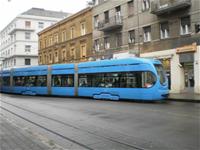 The conclusion from all the above is that both the EU and candidate countries have indeed learned a lot from Bulgaria's accession. The mere fact that the problems of Croatia are comparable to those of Bulgaria, given that Bulgaria is an EU member for 3 years now, is eloquent enough. And shows that neither the Union will make a compromise in the negotiations, nor Croatia - in its preparation. Bulgaria, in turn, also needs to stop making compromises and start using its European membership to change itself.
The conclusion from all the above is that both the EU and candidate countries have indeed learned a lot from Bulgaria's accession. The mere fact that the problems of Croatia are comparable to those of Bulgaria, given that Bulgaria is an EU member for 3 years now, is eloquent enough. And shows that neither the Union will make a compromise in the negotiations, nor Croatia - in its preparation. Bulgaria, in turn, also needs to stop making compromises and start using its European membership to change itself.
 Bakir Izetbegovic, Andrej Plenkovic | © Council of the EU
Bakir Izetbegovic, Andrej Plenkovic | © Council of the EU Aleksandar Vucic, Recep Tayyip Erdogan | © Serbian Presidency
Aleksandar Vucic, Recep Tayyip Erdogan | © Serbian Presidency Jean-Claude Juncker, Zoran Zaev | © European Commission
Jean-Claude Juncker, Zoran Zaev | © European Commission